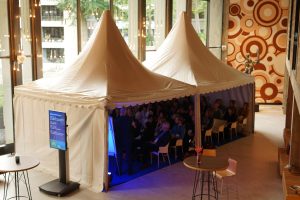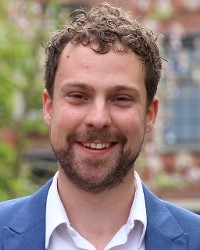Urban Studies Community
De Dag van de Stad (Day of the City)
Geplaatst in NewsFlash.
On October 28th the Hague hosted the Dag van de Stad, an annual event about development of the city. It was a perfect day to be informed about current urban innovations and challenges. The programme clearly shows that Urbanists form a vibrant and creative community. A dazzling variation of speakers presented current issues and solutions during workshops, pecha kucha’s, city safari’s, roundtables, lectures, keynotes, design studios, dragon den’s and Q&A’s.
Topics on the agenda evolve from theoretical reflection, technological innovation and changed reality in specific neighborhoods. Most of these are policy driven, such as a presentation on new forms of cooperation in urban development projects, which have to lead to more inclusion and better solutions. Particularly charming and impressive was a plea on prevention of cities losing their ‘soul’ due to extensive tourism. Another inspiring session discussed initiatives that raise the accessibility of the city for elderly people. In the same line mixed housing for students and elderly people turns out to be a double-edged sword: Students benefit from the space elderly people can provide, whereas elderly people receive company as a medicine to combat their loneliness. Despite all the attention for a wide range of themes, it was impossible to miss innovations that allow smart dealing with energy and consumer goods.

I decided to join a lecture of Prof. dr. Ellen van Bueren (Urban Development Management , TU Delft) who discussed the concept of integral urban development. She argued that innovations in urban development that are a result of combining fields (e.g. waste management and energy production) are often hindered by institutional regimes. Small-scale projects often manage to create a space in which they can be (partially) exempted from these regimes. In large-scale projects however, a confrontation between needs of the innovation and current regimes is inevitable. A number of large-scale projects implemented recently have failed or are likely to fail. Therefore, an unintended consequence of a failed project often is the strengthening of current institutional regimes. Prof. dr. van Bueren presented models for the development of institutional regimes in large-scale urban development.
A session hosted by the sharing cities alliances encouraged further thinking on the effect of (technological) innovation on institutional regimes. The sharing cities alliance currently joins 60 cities from all over the world. These cities share best practices on improvement of city life. On the one hand this includes dealing with innovative companies that challenge current regimes such as Airbnb, Uber and food-delivery companies. On the other hand it involves pro-active, innovative measures taken by municipalities. The founder of the sharing cities alliance, Pieter van de Glind, presented a great number of fantastic solutions, of which a number discuss regime changes. The examples include social sharing, sharing of sustainable innovations and of smart solutions (see link below).
Last but not least, and closer to home, a presentation on Urban Labs elevated the relevance and opportunities of student involvement in city development. Students, policy officials and neighborhood inhabitants develop research questions and together provide solutions for challenges within neighborhoods.
The Dag van de Stad offered many ideas and insights on current and future roles of students at Urban Studies. The possibilities to engage in city making are numerous, those who wish to get a grasp of what’s out there, should definitively visit the Dag van de Stad website and visit next year’s event.
Links:
www.sharingcitiesalliance.com
www.dagvandestad.nl
Written by Jetse Siebenga
https://www.universiteitleiden.nl/medewerkers/jetse-siebenga#tab-1

